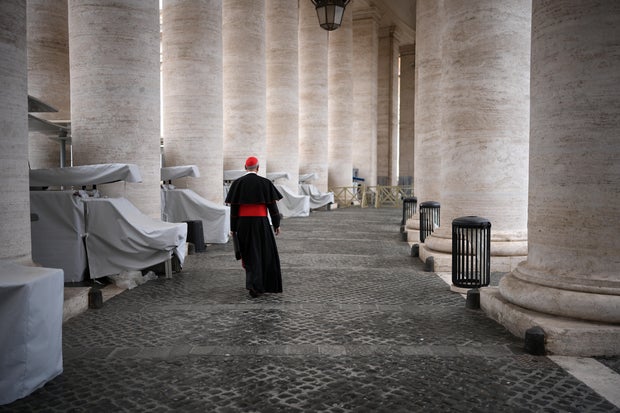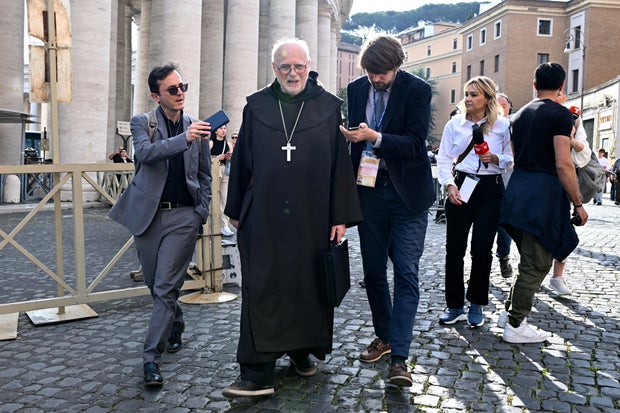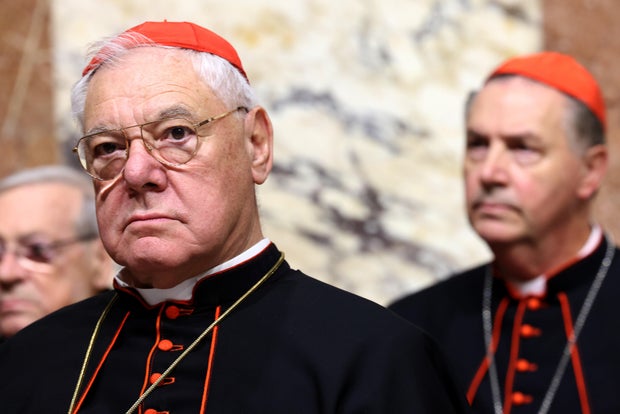Catholic Church prepares to pick new pope
Rome — It's been called "holy smoke." And it's color coded.
Black and white plumes puffed from canisters over the weekend as pyrotechnics expert Massimiliano De Sanctis tested the mechanism that will signal the fate of the Catholic Church, and who will be the next man to lead its 1.4 billion followers.
If the smoke that emerges from the chimney at the Sistine Chapel is black, it will mean the 133 cardinal electors inside for the papal conclave will continue voting. When it is white, it means they have elected the heir to St. Peter — and more recently, to Pope Francis.
''Until the election of Pope Benedict XVI, the smoke was carried out in the traditional way," explained De Sanctis, who owns the FD Group Fireworks company. "Ballots were burned to make black smoke and ballots were burned together with wet straw to make white smoke. But the Vatican realized that the smoke was not particularly intense, so it had an electrical control unit designed that controlled the classic pyrotechnic smoke.''
 A March 9, 2013, photo taken just before the conclave that saw Pope Francis elected to lead the Catholic Church shows the stoves in which cardinals' vows are burned and from which black or white smoke is emitted during a conclave, inside the Sistine Chapel in Vatican City.
Grzegorz Galazka/Archivio Grzegorz Galazka/Mondadori Portfolio/Getty
A March 9, 2013, photo taken just before the conclave that saw Pope Francis elected to lead the Catholic Church shows the stoves in which cardinals' vows are burned and from which black or white smoke is emitted during a conclave, inside the Sistine Chapel in Vatican City.
Grzegorz Galazka/Archivio Grzegorz Galazka/Mondadori Portfolio/Getty
The nine-day mourning period for the late Pope Francis, who died at the age of 88 on April 21 after 12 years leading the Catholic Church, officially came to an end Monday. As that period, known by its Latin name Novemdiales, came to an end, dozens of cardinals, carpenters and pyrotechnics experts were already at work preparing for the conclave to elect Francis' successor.
Vatican firefighters installed the chimney at the Sistine Chapel over the weekend, along with the small stove in which the cardinals will burn their crumpled up ballots after each vote. The voting continues, with one round on the first day of the conclave and then up to four daily until one proves conclusive, with a new pontiff being chosen by a majority of two-thirds plus one of the 133 electors.
Different ideologies at play as cardinals mull next Catholic leader
That secretive process begins Wednesday, with the first vote, but the cardinal electors have already begun descending on Vatican City from across the world. And with them, comes the intrigue of the political campaign-like process of selecting one of their own to lead the church forward.
 A cardinal arrives at the Vatican for a College of Cardinals' meeting, May 5, 2025, in Vatican City, in Rome, Italy, two days before the cardinal electors will enter the Sistine Chapel to begin the papal conclave, the secretive voting process that requires two-thirds-plus-one majority to elect the new leader of the Catholic Church.
Christopher Furlong/Getty
A cardinal arrives at the Vatican for a College of Cardinals' meeting, May 5, 2025, in Vatican City, in Rome, Italy, two days before the cardinal electors will enter the Sistine Chapel to begin the papal conclave, the secretive voting process that requires two-thirds-plus-one majority to elect the new leader of the Catholic Church.
Christopher Furlong/Getty
Some of the believed front-runners among the cardinals would be expected to align with the policies and philosophies of Pope Francis if they were to get the Catholic Church's top job, including newly-minted Swedish Cardinal Anders Arborelius. He told CBS News over the weekend about meeting with many of his fellow cardinals for the first time.
"I must say, I'm surprised that it's so peaceful and such a friendly atmosphere," he said. "If you read the papers, you get the idea that there are two parties fighting for power."
"Of course there are different points of view," acknowledged Arborelius, who is attending his first conclave. "It's natural."
Much like Francis was, Arborelius is a strong supporter of immigrants' rights. He said migrants to Europe have helped to keep Catholicism alive and well on the continent, making them "very important for the church."
"I know there are exceptions, but still, we live in a global time, and it's nearly impossible to stop migration. And we need it also, I mean, in healthcare, care for elderly people, taxi drivers," he said, adding that, "of course, there has to be some kind of order, some kind of harmonious migration and integration" to ensure immigrant populations can thrive.
 Swedish cardinal Anders Arborelius arrives for a congregation meeting at the Vatican before the papal conclave, May 3, 2025.
FILIPPO MONTEFORTE/AFP/Getty
Swedish cardinal Anders Arborelius arrives for a congregation meeting at the Vatican before the papal conclave, May 3, 2025.
FILIPPO MONTEFORTE/AFP/Getty
The Swedish cardinal also hopes Francis' successor will push to integrate women — to a limited degree — more into the church's operations.
"Some people are very eager to have female priests," acknowledged Arborelius. "But we cannot have that. So, it's important to show and to help women to find the positions and the work that they can do in the church."
Asked why he, like Francis, backed more roles for women, but not priesthood, the cardinal said that, "according to our faith, Christ as a man is the icon of what it is to be a priest. Mary is the icon of what a woman can be in the church."
"Of course, nowadays it's not easy to explain that," he said, noting the example of the Lutheran Church in Sweden, which he said now has "more female ministers than male."
"So that's one of our tasks — to show that women have a very important place in the church, but we have to show what they can do and how they can do it. And I think Pope Francis has started this. For instance, now they always say in the Vatican state they have a prime minister who is a sister, Sister Rafaela. And on many issues, for instance I'm also a member of the Council of Economy, we have six ... experts in economy, all women, who help us to clear up the mess of the economy in the Vatican. So, I think there are many important tasks where a woman could do very much in order to help the church in the society of today."
Others among the senior prelates gathering at the Vatican, however, have been openly critical of Francis, including German Cardinal Gerhard Muller, who has been a staunch defender of traditional Catholic doctrine.
"Gay marriage is not possible, it's absolutely against the word of God," he told CBS News, adding that in his view, that impossibility extends to the practice of priests blessing same-sex unions — which Francis green-lighted in a landmark decision almost two years ago.
 German cardinal Gerhard Muller (left) attends the "Joseph Ratzinger-Benedict XVI Prize 2024" at the Sala Regia of the Apostolic Palace, in a Nov. 22, 2024 file photo taken at the Vatican.
Franco Origlia/Getty
German cardinal Gerhard Muller (left) attends the "Joseph Ratzinger-Benedict XVI Prize 2024" at the Sala Regia of the Apostolic Palace, in a Nov. 22, 2024 file photo taken at the Vatican.
Franco Origlia/Getty
"We cannot have a blessing in the sense of justifying of a behavior or of a lifestyle which is against the reason God Himself gave," Muller told CBS News, adding that he believes the next pope must bring more clarity to interpreting Catholic doctrine, "I think not only for me, but for all the Catholics in the world."
It's possible that that diversity in viewpoints among the cardinal electors inside the Sistine Chapel could lead to a drawn-out conclave.
In recent times, cardinals have decided on a new pope in just two to three days.
The longest-ever conclave took place during the 13th century, in the nearby city of Viterbo. It lasted for nearly three years, and locals became so frustrated with the dithering that they removed the roof from the building where the cardinals were staying. They eventually elected Pope Gregory X.
Tucker Reals contributed to this report.












 English (US) ·
English (US) ·